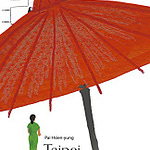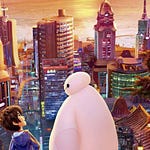20 years ago, on a balmy suburban summer evening I sat down on the couch next to my father and watched a few plucky Americans save the world. This time the heroes were a group of rugged oil drillers and brave astronauts who detonated a meteor barreling towards Earth.

Don’t worry world. America’s got this.
The United States— coming off a big game 7 series-clinching W from the Cold War— was the unquestioned leader of the free world. Each summer we tuned in to reaffirm that message and see how courageous Americans would pull the world’s ass out of the frying pan once again.
Science fiction disaster films like Armageddon and Independence Day were perfect mechanisms to deliver this message of American Exceptionalism. The stakes are naturally ratcheted up to a global scale, and each character is responsible for representing the views of an entire nation. These circumstances create a unique situation for filmmakers to illustrate their version of the global hierarchy. What countries are included in the group destined to save the world? Who will be the protagonist nation’s closest allies? Who will stand in their way? Who will be left out of the picture? And most importantly: which country will save the day?
In episode 23 of The Electric Image Express, Mazy Yap and Eric Lee join us to examine how the People’s Republic of China answer these questions in China’s first science fiction epic: The Wandering Earth. The Wandering Earth shares the same crazy science, unnecessary melodrama, and national message as Armageddon, and is worth watching just to observe who the CCP approved as friends and potential allies: A Chinese astronaut gets help from his Russian cosmonaut buddy to uncover a hidden plot. Chinese military race to an Indonesian station to deliver a crucial payload.

Don’t worry world. China’s got this.
Sci-fi epics in general mirror their real life space programs— the scale, skill, and technical resources needed are restricted to a few select countries. A successful domestic production gives that country’s movie industry a certain level of prestige.
For better or worse, inclusion in the Hollywood version of these movies as crew members, rival factions or even outright villains shows your country is influential enough to occupy space in the American collective conscious. Japan and China are the two Asian nations that have occupied the most Hollywood sci-fi screen time, neatly coinciding with their real life threat perceived by Americans to the USA.
Japan reached its economic prime in the 1980s: affordable, well-made Japanese electronics began flooding the US market lining the pockets of cash-flush Japanese businesses who started aggressively purchasing US property. Some of this cash also found its way to Japanese animation studios, allowing them to churn out daring new cyberpunk stories like Akira (which we revisited in episode 15) and Ghost in the Shell. The exportation of commodities, cash, and culture began to seep into the minds of Americans. Blade Runner is the movie that best encapsulates this phenomenon, setting the tale in a dystopian 2019 Los Angeles rife with Japanese and Cantonese influences.

“どうぞ” the ramen cook says to Deckard, asking him to please take a seat.
Fast forward 20-odd years and China supplants Japan as the representative Asian sci-fi power at roughly the same time the PRC’s GDP overtakes Japan’s. Here are some key movies in the time frame and the relevant characters involved:
Sunshine (2007): Saneda Hiroyuki and Michelle Yeoh are part of an international crew aboard the Icarus II that tries to restart the sun.
The Dark Knight (2008): Ng Chin Han plays corrupt businessman Lau who unsuccessfully tries to escape Batman by fleeing to Hong Kong.
Inception (2010): Ken Watanabe plays Saito, the Japanese businessman backing the dream thieves’ reverse-heist.

The Lau Effect: China overtakes Japan in GDP and in Hollywood
After 2010, China overshadows Japan in the genre. Chinese characters quickly evolve from side plots and environmental obstacles (like the Tiangong space station Sandra Bullock and George Clooney try to use to escape back to Earth in Gravity (2013)) to key plot drivers (rescue space crew in The Martian (2015)) and antagonists (General Shang and the Chinese military in Arrival (2016)).
By the time American viewers are watching Sandra enter the Tiangong, the majority already have an unfavorable view of China. I couldn’t help notice the tonal shift between the helpful space crew of The Martian who tap into their humanity to save Matt Damon and the belligerent and hardheaded Chinese military in Arrival coinciding with a change to a presidential administration with a more confrontational strategy with China. (Trade wars, COVID, Huawei, Tik Tok etc.) Where Japan is associated with tech futurism, China’s portrayal more closely resembles the Russians in Cold War fears of the past.

These portrayals are not necessarily troublesome by themselves, but can be problematic if constantly delivered by the hands of mainly White Hollywood creators as they can exacerbate economic-induced xenophobia with roots all the way back to the Yellow Peril and veer into Techno-Orientalism:
“The phenomenon of imagining Asia and Asians in hypo- or hyper-technological terms in literary, cinematic, and new media representations, while critically examining the stereotype of Asians as both technologically advanced and intellectually primitive, in dire need of Western consciousness-raising.”
However if we tie this back to The Wandering Earth, we can see that lazy writers of any culture can produce problematic stereotypes at the highest level: The only Western character with any meaningful lines is Tim, a stereotypical bumbling idiot inserted for comic relief.

“Hi, I’m Tim. I’m half Chinese half Australian but my hair is bleached white and I only wear white clothes. All of my scenes are designed for people to make laugh at me.”
Today a Chinese kid can sit down with his father and watch brave Chinese astronauts save the world. Science fiction allows us to portray a future we want to see, but can also perpetuate hardened world-views. As always, the message is this: the more well-researched content created by a diverse group of writers and directors we have, the brighter our future will look.
Enjoyed this article? Subscribe to get bi-weekly thoughts on Asian American representation and Asian film directly to your inbox.
Further Reading:
Chloe Gong: TECHNO-ORIENTALISM IN SCIENCE FICTION
Pew Research: U.S. Views of China Turn Sharply Negative Amid Trade Tensions
Variety: China Issues Guidelines on Developing a Sci-Fi Film Sector













Share this post